Green Pastures
We pulled the numbers from campaign reports filed with the Texas Ethics Commission and the Federal Election Commission and ranked officeholders and candidates by how much they had in their accounts at mid-year.
The first chart ranks everyone, followed by statewides, senators, representatives, former officeholders, and political action committees. We cut everything below $100,000 to keep the sizes manageable.
Notes: Two of the million-dollar babies — Steve Wolens and Ken Armbrister — are out of office and could run for something else or give their money to candidates (that's true for all of the former officeholders, but those two have a lot of dough).
Only three statewide officials broke into the top 10, and Attorney General Greg Abbott swamps everyone in terms of cash on hand. The only Texas politician with more money (we're not counting presidents) is Kay Bailey Hutchison, who had $7.7 million on hand at mid-year.
There were four state senators in the top 10. Only two current House members — Speaker Tom Craddick and Rep. Burt Solomons, R-Carrollton, ranked in the top 20.
We left PACs on their own list, but the richest of them — Texans for Lawsuit Reform — would have ranked tenth among the candidates and officeholders.
Finally, there's a list of federal officeholders and wanna-bes. Hutchison's first, followed by U.S. Sen. John Cornyn, who's actually on the ballot next year, followed by the U.S. Reps who have to run every two years. Again, we trimmed everyone with less than $100,000 off the list. And the congressional list, like the state one, has some former officeholders on it. Federal campaign contributions have tighter rules than state contributions. But a federal account can usually be converted to a state race if the candidate is interested.
Click on any chart to download a printable file of the full set.
Roughing It
U.S. Sen. Kay Bailey Hutchison has her mind on her money and her money on her mind.
The state's senior senator recently told the Houston Chronicle that she's needs "financial stability" before she retires.
"I certainly would like to make money. I think I've given up a lot of earning potential being in public service," Hutchison told the paper.
According to her publicly filed personal financial disclosure records, the senator and her husband, Ray Hutchison, shared a net worth of between $2.7 million to $7.3 million in 2006.
Hutchison's Senate salary last year was $165,200. She also received a $41,666 advance from publisher Harper Collins, according to those filings.
Senators don't have to report the values of their residences. Hutchison's personal disclosure reports do not include her $2.1 million home the senator shares with her husband — a senior partner at the Vinson and Elkins law firm — in Dallas. They also don't include the home the Hutchisons own in suburban Washington, D.C. Through a spokesman, Hutchison declined to put a value on that property, or to comment on her financial standing. In 2005, the Center for Responsive Politics ranked her 28th in net worth among the 100 senators.
The state's senior senator is also eligible for a federal pension, which would amount to about $107,000 a year if she were to retire today. The yearly stipend would presumably be higher if the 64-year-old decided to serve all of her third term and retire in 2012.
Her latest campaign disclosures with the Federal Election Commission show Hutchison has about $7.7 million in political cash at her disposal, which she could convert to a state account for a run at the governor's office if she chooses to do that.
Copies of Hutchison's personal disclosure forms can be found at the Senate's office of public records (in-person only, at the Hart Building, Room 232), or online at the OpenSecrets.org website run by the Center for Responsive Politics (while you're there, be sure and check out who the richest and poorest politicians were in 2005).
—by Alan Suderman
Questions of Politics
The Texas House's head Democrat — Jim Dunnam of Waco — isn't making a legal argument in the battle over the powers of the speaker, but he's making a political one.
He didn't write a brief on the questions over the powers of the speaker. Dunnam, who heads the Democratic Caucus in the lower chamber, instead wrote a letter (in our Files section, along with all of the other briefs and papers that go with this opinion request) saying he has questions about conflicts that could taint any answer from Attorney General Greg Abbott.
He laid those out in a memo to other House members, saying Abbott and House Speaker Tom Craddick are funded, in large measure, "by the exact same sources." And Dunnam questioned the "fairness of the forum" where the questions are being handled. He says the two Republicans have received at least 1,416 contributions of $2,500 or more from people who've given each of them at least that much money. That includes 150 donors who've given at least $12,500 each to Abbott and to Craddick. It's another way to say the same group funds many or most of the top officeholders in the GOP, much as a different group backed most of the Democrats who used to occupy those offices. Dunnam didn't compare donations to other Republican state officials in that memo, but he questioned whether Abbott can be fair under the circumstances.
"Given the fact that Abbott and Craddick rely on the same group of Republican moneymen, corporate political action committees, and Austin lobbyists to fund their political careers, one must ask how realistic it is to think that any opinion from Abbott on the scope of Craddick's powers will be anything but favorable to his close ally," Dunnam wrote.
Abbott, you'll remember, has been asked for his official (and non-binding) opinion about the powers of the speaker and of members of the House who want to challenge his rulings and/or his post. The AG is collecting briefs. If he decides to rule, he has until December to do so. And Craddick or any other speaker candidate could defuse the question by recommending the House change its rules to clarify two questions in particular: Whether members can overrule the speaker when he refuses to recognize someone, and whether and how a speaker can be deposed or replaced during a session.
• One argument from Team Craddick is that the state constitution says members of the House should elect a speaker at the beginning of a legislative session. And the Speaker's lawyers say that's evidence that the framers didn't want races for that position to take place during the middle or end of a legislative session.
Hit your rewind button. Remember the argument the state made for mid-decade redistricting? Federal law says the states should draw legislative districts each decade with the new numbers from the latest census. Craddick and other Republican lawmakers — and ultimately, the state government — told the courts that since there is no prohibition against mid-decade redistricting, it's allowed.
Now Craddick's foes are making the same argument. Since there's no law against mid-session races for speaker, they contend, they're allowed.
The courts decided mid-decade redistricting is, in fact, legal. The questions over Speaker battles aren't being contested in court. And Abbott's ruling, if he makes one, isn't legally binding.
Quick! Who's Ray McKinney?
That will be the first name on the ballot in the Texas GOP's presidential straw poll in Fort Worth. A number of the candidates — apparently more interested in the state's donors than in its voters — are skipping the Texas contest.
The party is selling it as a chance for Texas Republicans to have some influence on a primary contest that's likely to decided before the real Texas primary in March.
The full ballot order: Ray McKinney, Sam Brownback, Mitt Romney, John McCain, Ron Paul, Rudy Giuliani, Fred Thompson, Duncan Hunter, Mike Huckabee, John Cox, Hugh Cort, and Tom Tancredo.
At least three — Romney, McCain, and Giuliani — don't have the Texas event on their calendars. At least five — Paul, Hunter, Cort, McKinney, and Huckabee — do plan to come. That straw poll is scheduled for the Saturday before Labor Day.
Popularity Contest
You can follow presidential candidate giving in Texas down to the zip code on the Federal Election Commission's map pages. Texans gave $8.2 million through mid-year, ranking the state third behind California, at $13.9 million, and New York, at $12.4 million.
Click here or on the picture below to go to the FEC's website. By their reckoning, Rudy Giuliani is the most popular candidate among Texans who contributed through the end of June. And Republicans extracted more Texas money than the Democrats. There's also a link to the federal map if you want to see what's going on elsewhere.
The website is interactive, so you can see how each candidate did in each state and even in specific locales, like Houston or Corpus Christi.
Fort Worth Special
No surprise here: The governor says the special election to replace Anna Mowery in the Texas House will be on November 6.
The Fort Worth Republican resigned earlier this month; her replacement in HD-97 will serve until January 2009, when her term is up. Candidates have until the last day of the month to file with the Secretary of State.
November 6 is the regular election date; this campaign will run in parallel with the constitutional amendment election.
Sibley 2.0
Rep. Charles "Doc" Anderson, R-Waco, will have a Republican primary opponent. It's a Sibley, but not the same one who threatened to run two years ago.
Jonathan Sibley, a lawyer and the son of former Sen. David Sibley, R-Waco, will run against Anderson next year. His older brother Adam talked about it two years ago and decided against a race. The candidate practices administrative law and is a registered lobbyists; he'll open a Waco office of Thompson Coe, the Austin firm where he works. He says he's not challenging Anderson because of any problem with the incumbent, but because he wants the job. He's got Waco roots, growing up and going to college and law school there. And his pop was the mayor before winning a spot in the Legislature.
The younger Sibley ducks when you ask about the race for speaker. "I don't think this is going to be about the speaker's race," he said, no matter how we phrased the question. Anderson was first elected in 2004, and has so far stuck with Speaker Tom Craddick in the leadership wars.
Flotsam & Jetsam
Dave Carney, who came to Texas as a political consultant to Gov. Rick Perry (and whose main office is still in New Hampshire) will consult Republican House incumbents through the Stars Over Texas PAC. He's played on the periphery; a third-party operation called Americans for Job Security ran ads attacking Rep. Tommy Merritt, R-Longview, a couple of election cycles back. Merritt was running for a state Senate seat at the time (it was a special election and didn't cost him his House seat), and Carney said then that the ads were an attack on taxes Merritt supported and not on Merritt himself. That's the election that put Kevin Eltife, R-Tyler, in the Senate.
• Gov. Rick Perry has a fundraiser at the Four Seasons in Austin coming up after Labor Day. He says he might run again and that's an early chance to see if his backers believe it. Speaker Tom Craddick, trying to put together a House that has at least 76 strong supporters in it, will have an Austin funder in mid-October. The Texas Association of Realtors is hosting that shindig.
• Republican Bill Welch, we're told, is making calls in anticipation of a possible rematch with Rep. Valinda Bolton, D-Austin, who beat him last November. He also lost a House race years ago, by a handful of votes, to fellow Republican Susan Combs, now the state comptroller.
• The sales tax holiday is over, and lawmakers want to expand it. Sen. Rodney Ellis, D-Houston, and Comptroller Susan Combs want to raise the price limit for tax-free goods to $150 from $100, and to expand the list of eligible items. The current three-day break from sales taxes includes clothes and backpacks and such, and costs the state about $52 million. Combs says the proposed expansion would add $17.4 million in sales tax cuts. Ellis says he'll try to win legislative approval for the changes in 2009.
• Rep. Rob Orr, R-Burleson, will take over as chairman of the House's Land & Resource Management Committee. Rep. Anna Mowery, R-Fort Worth, had that job but is resigning this month. Orr, who's in his second term, was been vice chairman when House Speaker Tom Craddick moved him up.
Snake Eyes
The 5th U.S. Circuit Court of Appeals overturned a lower court, saying Texas doesn't have to negotiate with the Kickapoo Indians, who want to open a casino. The Texas tribe asked the state to negotiate in 1994. The state refused, and the tribe went another route, asking federal authorities to use another procedure that would force the state to the table. The state responded with a lawsuit, lost in lower court, and won, now, at the New Orleans-based appeals court. That court said the federal court couldn't give the tribe the right to force the state to settle.
Political People and Their Moves
We've seen no official announcement yet, but former House Parliamentarian Denise Davis is apparently headed for the Austin offices of the Baker Botts law firm. She and her assistant, Chris Griesel, famously quit their jobs in the last days of the session as the speaker and the members warred over House rules.
Joe Beal is leaving the Lower Colorado River Authority early next year after serving as general manager since 1999. He's been at the agency since 1995. Early speculation has former Sen. Ken Armbrister, now a legislative aide to the governor, on the list of potential replacements.
Gov. Rick Perry gave three of his most coveted appointments — commissioner posts at the Texas Parks & Wildlife Commission — to Dr. Antonio Falcon of Rio Grande City, Karen Hixon of San Antonio, and Margaret Martin of Boerne. Falcon is medical director of the Family Health Center. He's replacing Joseph Fitzsimons of San Antonio. Hixon, whose husband, Tim Hixon, is a former commissioner, is on the board of TPW's foundation and used to serve on the boards of Environmental Defense and the Texas Nature Conservancy. She's replacing Ned Holmes of Houston. And Martin is the owner and operator of a Webb County ranch and is starting up a tea brokerage and export business. Her spot was occupied by Donato Ramos of Laredo.
Perry moved Buddy Garcia, his most recent appointee at the Texas Commission on Environmental Quality, into the middle chair. Garcia, a former aide to the governor, will chair that three-member panel. He's been there since January; before that, he was assistant Texas Secretary of State.
Teresa Clingman of Midland will replace her boss, District Attorney Al Schorre, who retired earlier this summer. The Guv named Clingman to the job and she's telling locals she'll seek a full term when the post is on the ballot next year.
Perry named Thomas Whaylen of Wichita Falls to the Texas Military Preparedness Commission. Whaylen, an Air Force vet, is president and CEO of the Sheppard Military Affairs Committee.
Gilbert Amezquita of Harris County got a pardon from the governor on the recommendation of the Texas Board of Pardons and Paroles. He was convicted of aggravated assault in 1998 and sentenced to 15 years in prison, but it turns out that someone else committed the crime.
Diane Black Smith is the new deputy for administration at the Attorney General's office. AG Greg Abbott also promoted John Poole, making him the agency's new human resources director. Angela Hale, who left a TV news career to become the agency's communications director, moves into a new job as senior advisor to Abbott, and Jerry Strickland, her deputy, is moving into her old post.
House Speaker Tom Craddick joins the board of directors of the American Legislative Exchange Council, or ALEC. He was elected secretary at this summer's meeting. And Land Commissioner Jerry Patterson has been named president of the Western States Land Commissioners Association, which includes his counterparts from 22 other states.
Lulu Flores of Austin is the new president of the National Women's Political Caucus. She's the second Texan to hold that post in the 34 years the NWPC has been going; the first was Frances "Sissy" Farenthold.
Quotes of the Week
U.S. Sen. Kay Bailey Hutchison, in an interview with the Houston Chronicle: "Before I retire, I need to have financial stability. I could certainly see another career in the private sector... I certainly would like to make money. I think I've given up a lot of earning potential being in public service."
Amarillo ISD Superintendent Rod Shroder, talking to KVII-TV about a new law that allows students, in some situations, to talk openly about religion: "There will be interest groups on both sides of this issue that will be watching what schools do. And the prediction is, it doesn't matter what a school does, they will be sued from one side or the other."
House Appropriations Chairman Warren Chisum, R-Pampa, telling the Houston Chronicle what he thinks of the Transportation Department's $7 million to $9 million campaign to promote the Trans Texas Corridor: "It's a waste of money, and they have no business out there trying to get public opinion to be in their favor."
Karen Hughes, former spokeswoman for George W. Bush, talking to the Associated Press about staff changes in the White House: "With all the Texans gone, there will be a lot of funny accents in the West Wing."
Rep. Sid Miller, R-Stephenville, telling the Stephenville Empire-Tribune how he came to be fined by the Texas Ethics Commission for mistakes in his campaign finance reports: "My sister volunteers to do my books and I can’t fire my sister."
San Marcos Police Chief Howard Williams, telling the Austin American-Statesman about preparations for the annual sales tax holiday: "We set it up as if this was some kind of mass casualty event."
Texas Weekly: Volume 24, Issue 10, 27 August 2007. Ross Ramsey, Editor. Copyright 2007 by Printing Production Systems, Inc. All Rights Reserved. Reproduction in whole or in part without written permission from the publisher is prohibited. One-year online subscription: $250. For information about your subscription, call (512) 302-5703 or email biz@texasweekly.com. For news, email ramsey@texasweekly.com, or call (512) 288-6598.
Texas Tribune donors or members may be quoted or mentioned in our stories, or may be the subject of them. For a complete list of contributors, click here.
Information about the authors
Learn about The Texas Tribune’s policies, including our partnership with The Trust Project to increase transparency in news.
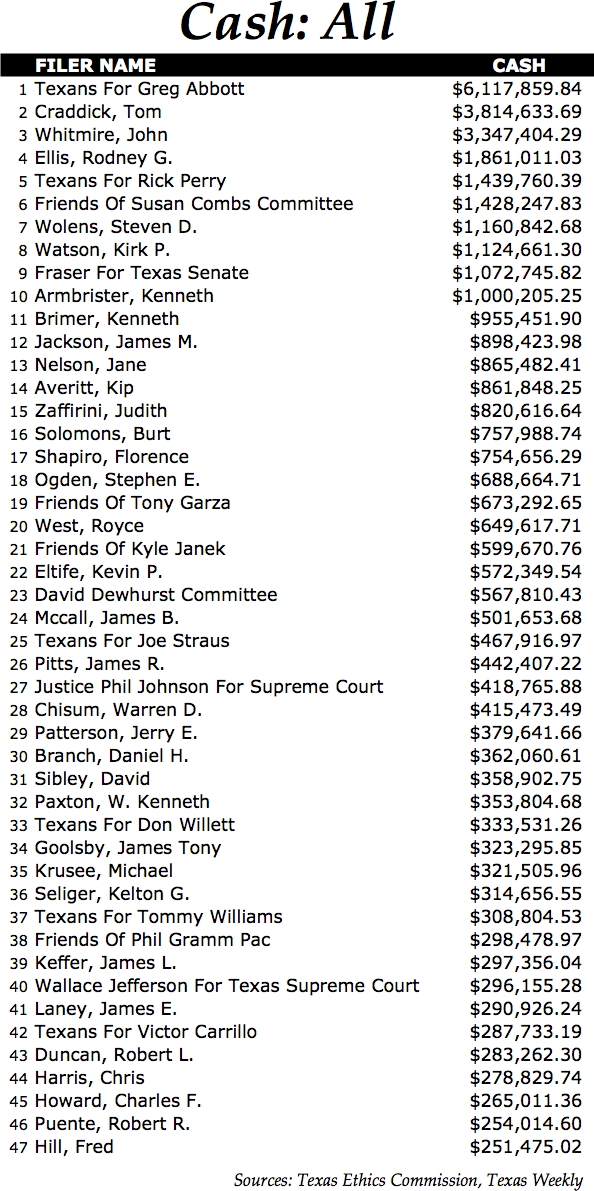
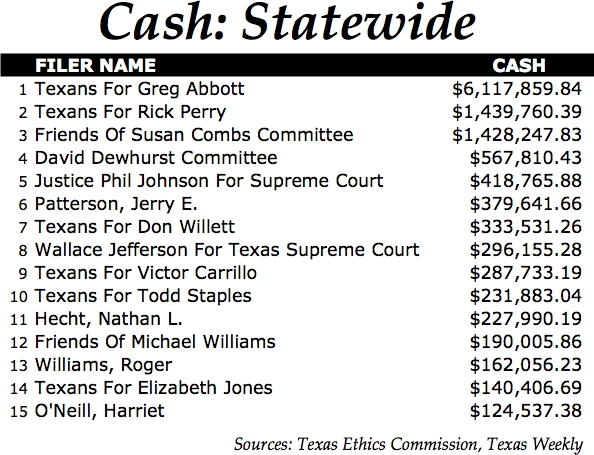
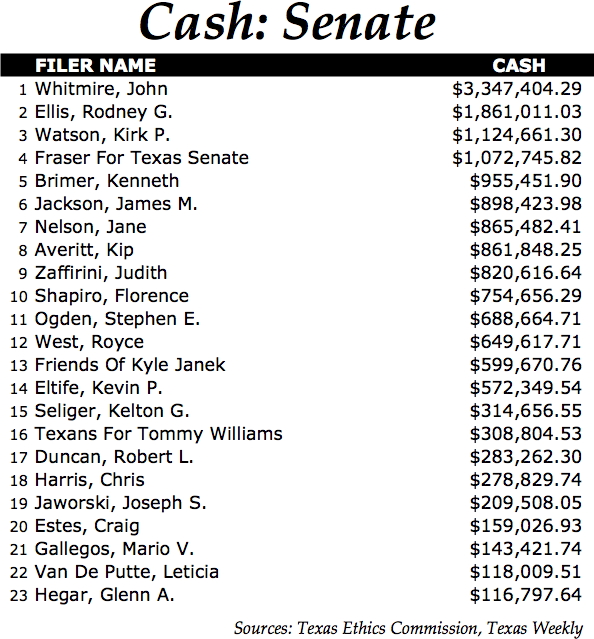
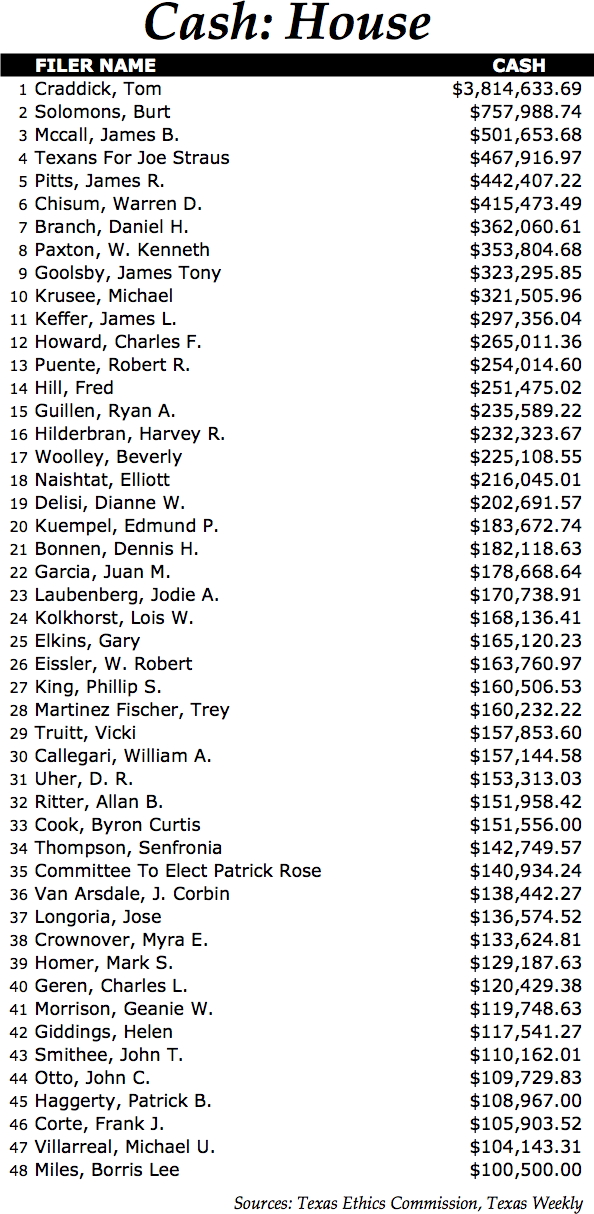
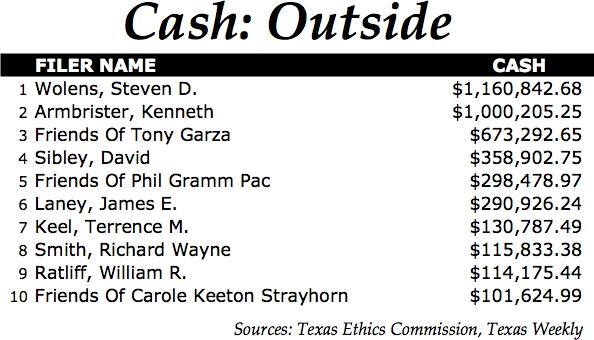
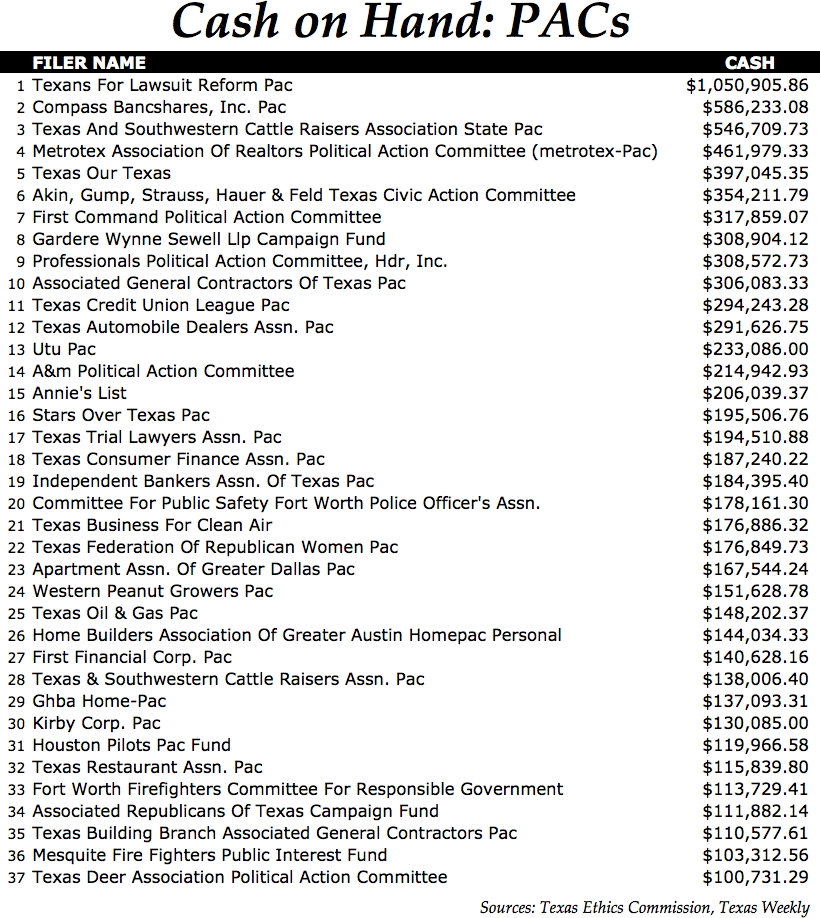
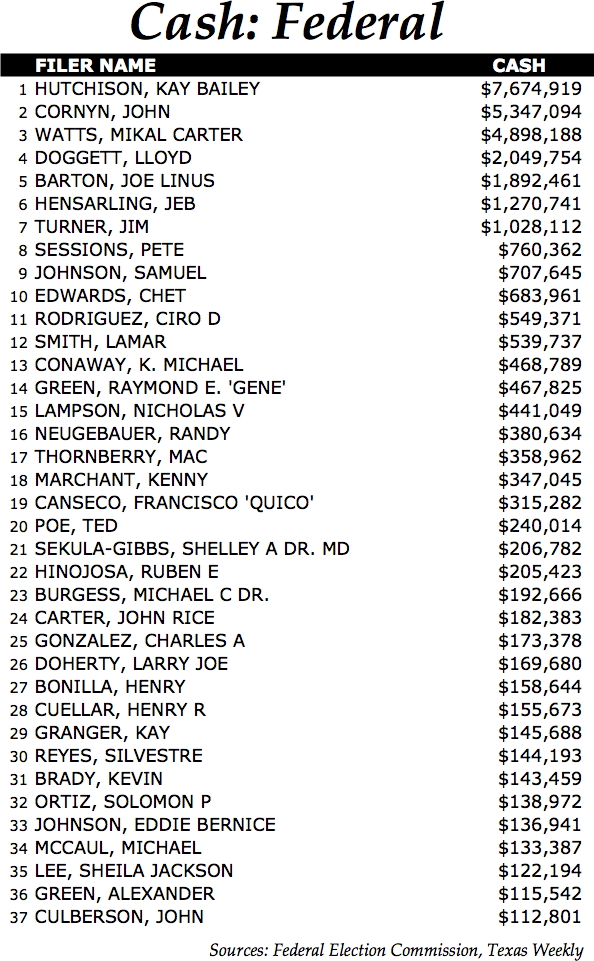
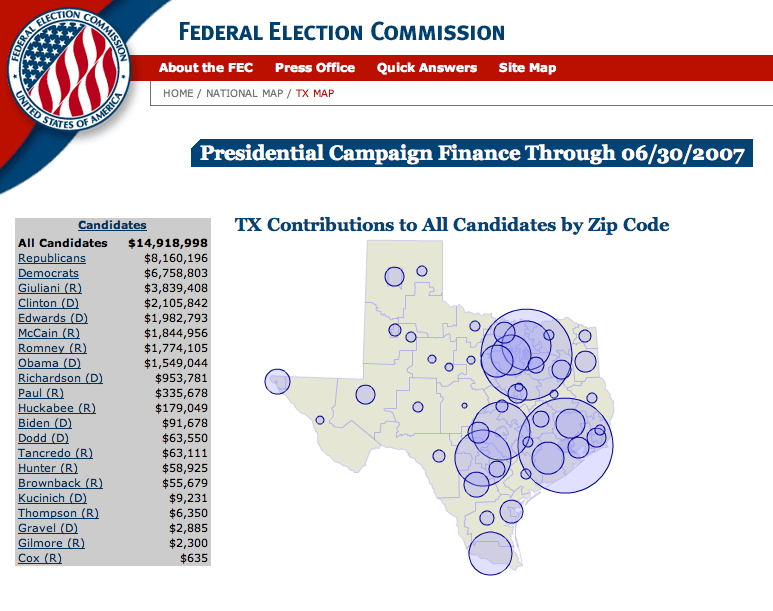
/https://static.texastribune.org/media/profiles/ramsey-ross_TT.jpg)